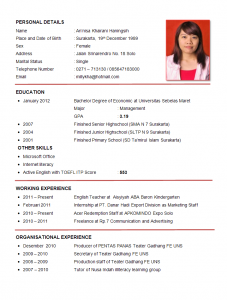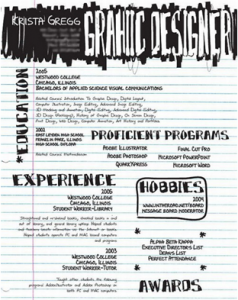 (Image: “Angels on My Shoulders.” 2011. Web. Courtesy of Daniebob on WordPress)
(Image: “Angels on My Shoulders.” 2011. Web. Courtesy of Daniebob on WordPress)
Is it acceptable to lie to a potential employer for an opportunity at your dream job? The right answer is no, but my answer is YES.
“The percentage of people who lie to potential employers is substantial” (Tomassi), and who can blame them? Employers intimidate us in ways that slightly encourage us to shade the truth. In fact, “40 [percent] of all resumes aren’t altogether aboveboard” (Tomassi). Given the circumstances of seeking for a job in a highly-competitive market, it is understandable that one of the ways people influence their resumes is by lying. “Omission is one of the most common forms of lying in the workplace” (Goman) because people want to avoid discrimination. Let’s consider Joanne Rowling. Most of us know her as J.K. Rowling. She omitted her name with the intention of misleading the reader of her sex. “Joanne Rowling had somehow gotten the idea that books by women were not as widely read or taken seriously as books by men—or that boys shy from reading female authors—and so had chosen to be known by her gender-neutral initials” (Prose).
As common as omission is in a resume, the same is not recommended for resumes internationally. In fact, resumes between the US and Asia differ tremendously. My father lives in Vientiane, Laos, and is the chairman of our family’s distribution company, KP Co., Ltd. During the summer, I visited him at the peak of hiring season and saw stacks of resumes on a desk. The sample resume below is a very similar template of one that I saw; instead of omitting personal details, they emphasize them. Click the photo below for a closer look.

(Image: “English Teacher Resume Review.” 2014. Web. Courtesy of An’nisa Khairani Haningsih on All Docs)
“Different countries expect and require certain information to be present on resumes, and therefore it is critical that your new resume meets the unique requirements of that country” (Redelman). Thus, resume-writing conventions need to adapt to their current marketplace whether it is an entirely different culture or within different domestic fields of study. It is important because the standard “one-size-fits-all” template is no longer enough to capture everyone’s attention. The field in which you apply influences the multimodal tools in your resume. For example, the following resume emphasizes the applicant’s talent in graphic design. Obviously, this would be an inappropriate template for legal professions.

(Image: “Graphic designer resume sample.” 2014. Web. Courtesy of Vizual Resume.)
Between the two resume examples, there are differences in the contents. The second resume does not include a self-photograph or personal details that risk discrimination; though, both applicants could have lied by embellishing their experiences. This raises the question: how do we know that our competitors will not be lying in the same way that we are? “[We are] lied to from 10 to 200 times per day” (Firestone), so there is a great possibility that people are more likely to stretch or bend the truth on their resumes. After all, it becomes a cutthroat atmosphere when people are after the same job. However, I do believe that we have a moral obligation to our employers by telling them truthful experiences and giving them valid credentials so as not to waste their time interviewing us, or further, investing time and money to train us for our jobs. I think that the reason for interviewing someone is not only to get to know the applicant, but also to cross-examine the details of his/her resume. So, if you are going to embellish your experiences and credentials, then it is your sole responsibility to defend your claims.
While there are similarities between what U.S. and international applicants will do to make their resumes standout, there are differences in addition to the unique resume requirements of each country. When a U.S. citizen seeks for a job abroad, or when an international applicant seeks for a job in the U.S., there will be dilemmas that could prevent each from getting a job. For example, one trying to understand and adhere to the laws of that country and risking law violations on behalf of the business. I think that in whichever country you are, you should follow their rules. This applies to U.S. and international corporations and employees.
Another issue is language barriers that lead to miscommunication. What if a word or phrase in your resume means something entirely different in another country? It could offend the employer, or you may even have lied about your credentials unknowingly. Would you consider this lying?
Whether we think of ourselves as liars or not, “we certainly shade the truth to make it fit more comfortably into our lives—to keep it from disrupting anything from our careers to our relationships to our afternoons” (Firestone).
Sources Cited
Firestone, Lisa. “Shades of Truth: The Many Ways We Lie.” Huffingtonpost. Web. 5 Sep. 2014 <http://www.huffingtonpost.com/lisa-firestone/telling-the-truth_b_3831304.html>.
Goman, Carol Kinsey. “The 10 Most Common Workplace Lies.” Forbes. Web. 5 Sep. 2014 <http://www.forbes.com/sites/carolkinseygoman/2013/10/17/10-of-the-biggest-workplace-lies/>.
Prose, Francine. “How Do We Judge Books Written Under Pseudonyms?” NYTimes. Web. 5 Sep. 2014 <http://www.nytimes.com/2013/11/17/books/review/how-do-we-judge-books-written-under-pseudonyms.html?pagewanted=all&_r=0>.
Redelman, Gavin. “How Resumes Differ from Country to Country.” Expatarrivals. Web. 5 Sep. 2014 <http://www.expatarrivals.com/article/how-resumes-differ-from-country-to-country>.
Tomassi, Kate DuBose. “Most Common Resume Lies.” Forbes. Web. 5 Sep. 2014 <http://www.forbes.com/2006/05/20/resume-lies-work_cx_kdt_06work_0523lies.html>.